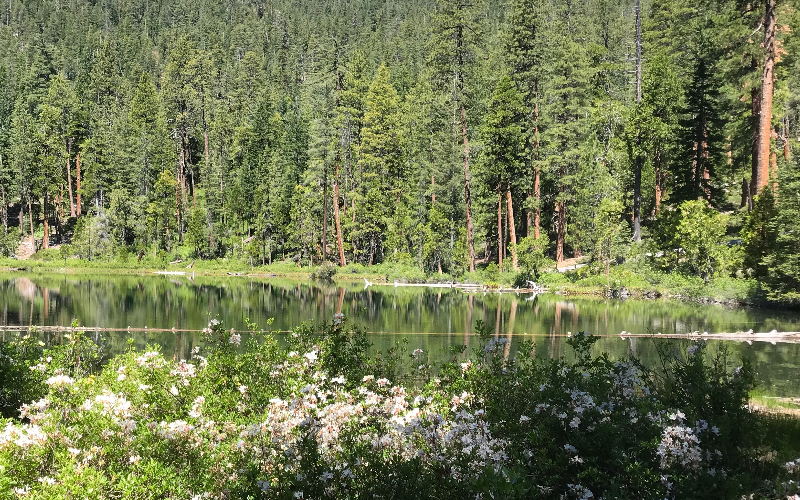
Winter 2025
Securing California’s Water and Wildlife: The Trinity Headwaters Conservation Project
In a unique partnership, PFT completed the acquisition and protection of almost 11,000 acres at the headwaters of the Trinity River, conserving some of the most biodiverse conifer forest systems globally and expanding the connectivity of protected lands across the Klamath-Cascade region.

This $15.5 million project has permanently protected nearly 11,000 acres, representing almost 10% of the Upper Trinity watershed. The project is a partnership with the Watershed Research and Training Center, based in Trinity County, to whom the land has now been transferred, while PFT holds a Working Forest Conservation Easement on it to ensure its sustained long-term ecological management and conservation. “We are looking forward to implementing innovative forestry, fuels reduction and fire-management strategies that demonstrate the potential for balancing profits with landscape ecological resilience and broad social benefits,” said Watershed Resource and Training Center’s Co-Executive Director Nick Goulette.
Located where the Klamath Mountains meet the Southern Cascades, the newly conserved land is both water rich and enormously diverse in its habitats and species of plants and animals. It comprises vast mixed-conifer forests, a significant network of wet meadows, springs, natural lakes, 4.5 miles of the Trinity River and over 50 miles of spring-fed tributaries!

The Trinity Headwaters project is a major contribution to California’s goal of conserving 30% of its land by 2030 (30×30), providing refuge for nearly 250 species of wildlife and plants, many of which are found nowhere else in the world.
With this amazing water and species richness, the project enhances the health and resilience of one of California’s most water-rich and biodiverse regions, providing essential habitat connectivity for endangered species such as the northern spotted owl, Sierra Nevada red fox, and Cascades frog. 
Linking multiple federally protected areas but maintaining the lands in private ownership and as a community focused resource, the project enhances critical wildlife corridors that allow species to migrate in response to climate change. This milestone builds upon Pacific Forest Trust’s goal of creating an integrated network of conserved headwaters forests in the Klamath Cascade to sustain both wildlife and water resources for generations to come.
The project was made possible by the collaboration of multiple funders: the California Wildlife Conservation Board, Sierra Nevada Conservancy, and an historic investment from the U.S. Department of Housing and Urban Development (HUD) for community development. “The Trinity Headwaters project is a novel initiative that has both ecological and community benefits, also bolstering the local economy,” noted Congressman Jared Huffman who led the effort to secure federal funding for this initiative.
“This acquisition will protect and improve the health and resilience of forests in one of the state’s most biodiverse regions,” said Jennifer Norris, Executive Director of the Wildlife Conservation Board. “Protecting this watershed will benefit native fish and water resources, sequester carbon, and provide critical habitat and connectivity for threatened and endangered species.”
The project originated with the Michigan-California Timber Company (MTCT) and was completed with New Forests, a timber investment management organization which purchased MTCT’s holdings in 2022. Such major projects take time, partnerships, dedication, and investment to complete, illustrating how critical public support for innovative conservation is.
The easement ensures that the land remains in sustainable, ecological management, supporting jobs and economic development in an economically disadvantaged area, while also protecting public trust resources including water, wildlife, and climate resilience. This balanced approach is exemplified by the innovative working forest conservation easement model, which permits private ownership and economic use of the land while safeguarding its ecological values.
The Trinity Headwaters Conservation Project stands as a model of landscape-scale conservation, improving the resilience of both natural ecosystems and human communities.
More in this Issue of ForestLife
- President’s letter: The Beauty and Blessings of Old Forests
- Supporting Habitat Resilience through Accelerating Fuels Management
- Pioneering Large-Scale Prescribed Fire for Healthy Private Working Forests
- Shaping California’s Fire Policy
- Documenting the Tallest Trees: A Conservation with Michael Taylor
- Engaging the Next Generation on Mount Ashland Demonstration Forest
- Donor Highlight: Erik Wohlgemuth
